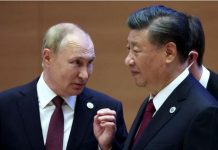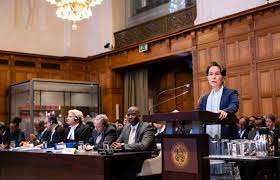The International Court of Justice is a body with few teeth, and the case of „genocide” is very weak.
Many Israelis and their supporters are scandalized and worried that the Jewish state will be accused this week of genocide in Gaza at “the Hague.” The situation in Gaza is terrible and the accusation is grave, but the actual case is weak and the venue somewhat absurd. I’d like to offer some perspective on this case, which will be heard on Thursday and Friday.
The Dutch quasi-capital is the seat of more than one global court. The one many were most exposed to has actually been the International Criminal Tribunal for the former Yugoslavia, specifically set up to try the likes of Slobodan Milosevic and Radovan Karadzic for their murderous over-exuberance in the cause of enlarging Serbia in the 1990s. It has been quite effective.
That is different from the International Criminal Court, which was established in 2002 when 120 states adopted the Rome Statute, agreeing to cede various powers to a common juridical body. These countries did not include the United States or Israel, for reasons one can guess at – but do include most of Europe and even quite a few dice-rolling non-democracies.
The ICC named as its first chief prosecutor Luis Moreno Ocampo, an Argentinian lawyer famed for hounding and helping topple the military junta that misruled his home country in the 1980s, and he was quite activist in pursuing genocide and other charges, for example in 2009 against the Sudanese dictator Omar al-Bashir.
But in a reflection of the difficulty of getting much done, al-Bashir for years travelled to many ICC-member countries in Africa and Asia that simply refused to arrest him. That is basically their right. He was finally deposed in 2019 and is now under arrest in Sudan and in theory awaiting extradition.
The court has also issued arrest warrants against Russia’s Vladimir Putin on account of his historic outrage in Ukraine. He may want to be careful about any upcoming travels.
Meanwhile, the Hague also hosts the International Court of Justice. This court was established in 1945 by the United Nations and as a consequence of that, all UN member states are theoretically fair game.
But here’s a story about the ICJ.
In December 2022, Azerbaijan blockaded the disputed and Armenian-populated enclave of Nagorno-Karabakh, cutting off the Lachin Corridor which was its 120,000 people’s sole lifeline to the world. In Feb. 2023 the ICJ ceremoniously ordered the blockade to be removed. The order was specific, using a future tense that suggests compliance is expected: “Azerbaijan shall ensure uninterrupted free movement of all persons, vehicles, and cargo along the Lachin Corridor in both directions… Azerbaijan shall immediately fully restore and refrain from disrupting or impeding the provision of natural gas and other public utilities to Nagorno-Karabakh.”
Did Azerbaijani dictator Ilham Aliyev start quaking in his boots? Hardly. He summarily ignored the order and in June ramped up the blockade, causing the aforementioned Ocampo to declare it a “genocide by starvation.” In September Azerbaijan attacked, compelling the entire terrified population of the enclave to flee in a spectacular ethnic cleansing. The blockade may no longer exist, but not in the way that was intended and no thanks to the hapless court.
Why did Aliyev behave this way? Easy. Because he could. You see, even though the ICC is not recognized by the US or Israel it does have some teeth. The ICJ may have both countries and every others, but embarrassingly lacks all teeth.
The enforcement mechanism of any ICJ ruling is the UN Security Council, which can apply economic sanctions or even authorize military forces against miscreants the court might turn up in its net (and there have been some cases where the council explicitly backed ICJ rulings). But an ICJ ruling is not a condition for UNSC action. The court might offer moral suasion, but otherwise matters little. What is needed for UNSC action is political will, and for any proposal to get past the five permanent members with their veto power.
Just as the US is unlikely to allow Israel to get hammered at the Security Council, Russia was similarly a protector of Azerbaijan, having signed a strategic alliance with the petrostate just days before the invasion of Ukraine in 2022. Russia’s ally is potentially useful in getting around the limitations imposed on its energy exports by the West, in its outrage over Putin’s invasion of Ukraine.
And is the US likely to have anything to defend Israel against? The charge by South Africa is genocide. You might think South Africa, a leading country on a continent that is no stranger to genocide, would know the material well. But the case is very weak – to my mind nonexistent. And that’s because of the definition that applies, and which the 15 judges, which decide by a majority opinion, will have to consider.
Ask most people on the street, and they’ll probably tell you that genocide is the murder of a huge amount of people from a given group. Over a million Armenians a century ago at the hands of the Turks around World War I; 6 million Jews at the hands of the Nazis during World War II; at least a half million Tutsis by the Rwanda government in the 1990s. In all cases the group was targeted simply for being who they are; the Nazis were weirdly obsessed with killing every Jew on Earth.
While those are unspeakably heinous crimes, they are not exactly what appears in the Genocide Convention, strictly speaking. They would qualify, but not necessarily because of their scale. It is this convention, approved by General Assembly in 1948, which contained the applicable definition under the fuzzy jurisdictions of “international law.”
The Genocide Convention, to which Israel and the US mercifully are signatories, defines genocide as “any of the following acts committed with intent to destroy, in whole or in part, a national, ethnical, racial or religious group, as such: (a) Killing members of the group; (b) Causing serious bodily or mental harm to members of the group; (c) Deliberately inflicting on the group conditions of life calculated to bring about its physical destruction in whole or in part; (d) Imposing measures intended to prevent births within the group; (e) Forcibly transferring children of the group to another group.”
Careful readers will notice that this definition can apply to the killing of a small handful of people, and it actually doesn’t require the successful murder of even a single person. The key word is “intent” – the intent to destroy the group in whole or in part. By this definition, there is no question that the Hamas massacre of Oct. 7 was genocidal, whereas the far deadlier Israeli action since is not. That’s because Israel has no desire to destroy the Gazans in whole or in part; it only wants Hamas gone (as do, I bet, most Gazans) and its remaining 140-odd hostages returned.
If large-scale killings meant genocide, then almost many war actions and most urban warfare would qualify, and one would be tangled up in knots trying to figure out when the scale was large enough to trigger the charge. If Israel’s actions in Gaza are genocide then so was last decade’s US-led war against the barbarians of ISIS, which is believed to have killed around 10,000 civilians in the Iraqi city of Mosul alone.
Which brings us to Israel’s appointment of former Israeli Supreme Court Chief Justice Aharon Barak as its representative judge to this event. Implicated nations can do this, and Israel’s choice might qualify as the most intelligent action (from a very short list) carried out by the government of Prime Minister Benjamin Netanyahu.
First, because while many judges at the ICJ are basically extensions of their governments, lending the whole thing an unhelpful political sheen, Barak is something else. He has been vilified by Netanyahu and his stooges for years as the architect of a supposedly activist and liberal court, allegedly doing the bidding of “elites” who despise the prime minister and his fanatical and farcical allies. Having been branded public enemy number one by the government over the last year of it’s benighted “judicial reform,” he is not in the Hague as its extension.
Second, because Barak knows something about genocide, and is the possessor of a personal history that might be able to shame his fellow judges into keeping the bullshit to a minimum. Born Erik Brik in 1936 in Lithuania, which was occupied by the Nazis when he was five, he is a survivor of a real genocide, by any definition.
Israel intends to continue its operation in Gaza, despite admitting challenges

















